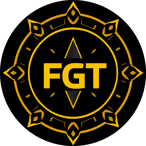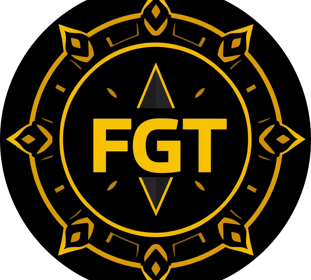Forgestone (FGT): The Future of Digital Ownership in the Metaverse
Discover how ForgeStone (FGT), the BEP-20 token powering AetherForge Realms, is revolutionizing decentralized metaverses with AI ecosystems, player-driven economies, and unparalleled utility.
Team Forgestone
3/10/20254 min read


Introduction to Forgestone (FGT)
Forgestone (FGT) is an innovative digital asset designed to enhance the concept of ownership within the expansive realm of the metaverse. As a BEP-20 token, FGT adheres to the standards set forth by the Binance Smart Chain, facilitating secure and efficient transactions while operating under the principles of decentralization. This digital currency represents a significant advancement in how individuals can possess, trade, and interact with virtual assets across various platforms.
The origins of Forgestone stem from the growing demand for unique digital ownership experiences in online environments. As the metaverse expands, the need for a reliable and standardized method of transferring and managing digital assets has become increasingly apparent. FGT addresses this need by providing a token that empowers users to retain control over their virtual properties, whether they are digital art pieces, virtual real estate, or in-game items. This ownership model not only fosters creativity and innovation but also opens up new avenues for economic activity within decentralized metaverses.
Understanding how FGT functions as a BEP-20 token is crucial to appreciating its role in the broader digital landscape. BEP-20 tokens leverage the functionality of the Binance Smart Chain, enabling seamless interoperability and integration with decentralized applications (dApps). By employing this standard, FGT assures users of its reliability, security, and accessibility in an ever-evolving digital ecosystem.
Moreover, Forgestone’s ecosystem aims to enhance the relationship between users and their digital ownership. By utilizing blockchain technology to authenticate and verify ownership, FGT instills confidence among users, ensuring that their investments are protected from fraud or unauthorized alterations. As digital ownership becomes a cornerstone of the metaverse, the significance of Forgestone cannot be overstated. It stands at the forefront of facilitating secure, efficient, and meaningful interactions within this new digital frontier.
The Role of Decentralized Metaverses
Decentralized metaverses represent a transformative evolution in the digital landscape, providing users with an immersive environment that champions autonomy and user participation. Unlike traditional metaverses governed by centralized entities, decentralized platforms are built on blockchain technology, empowering individuals to engage in a player-driven economy. This structure fundamentally shifts the control dynamics, allowing users to acquire, sell, and trade digital assets seamlessly.
Forgestone (FGT) plays a crucial role in this evolution by enabling vibrant player-driven economies within decentralized metaverses. By leveraging Forgestone, users gain the ability to monetize their virtual experiences, fostering a more engaging and rewarding digital environment. The platform facilitates the creation and management of digital assets, ensuring that participants have equal opportunities to innovate and thrive. This decentralized approach encourages creativity, as users can present unique content and experiences without the constraints imposed by centralized authorities.
The benefits of decentralization extend beyond economic opportunities. Enhanced security is a fundamental advantage, as blockchain technology ensures that transactions are immutable and transparent. Users can confidently transact without the fear of fraud or manipulation, fostering trust among participants. Furthermore, the transparency inherent in decentralized platforms allows for clearer visibility of ownership and transaction histories, establishing accountability among users.
In addition to security and transparency, decentralization offers users greater control over their digital assets. Individuals can determine how their assets are utilized and can engage in direct peer-to-peer interactions, eliminating intermediaries and associated fees. This empowerment not only enriches user experiences but also cultivates a sense of community within the metaverse. As more individuals adopt decentralized metaverses, platforms like Forgestone will continue to set the standard for innovation and user engagement in the digital ownership landscape.
AI Ecosystems and Their Integration with FGT
The integration of artificial intelligence (AI) ecosystems within the Aetherforge realms represents a significant advancement in digital ownership, particularly with the advent of Forgestone (FGT). This synergy aims to enhance the user experience by providing personalized interactions and automated functionalities that are fundamental to the metaverse. One of the primary features powered by AI is personalized content creation, which tailors experiences based on individual user preferences and behaviors. This not only allows users to engage with content that resonates with them but also fosters a deeper sense of connection with the virtual world.
Moreover, automated transactions powered by AI enhance the efficiency and security of digital exchanges in the metaverse. With FGT, users can conduct transactions seamlessly and securely, minimizing the risk of fraud while maximizing transaction speed. The incorporation of smart contracts, driven by AI technology, ensures that agreements are executed automatically under predefined conditions, further streamlining the ownership process of digital assets.
Additionally, AI enhances user interactions within Aetherforge by introducing smarter chatbots and virtual assistants that provide real-time support and guidance. These virtual entities are designed to understand user queries more effectively, delivering instant responses and solutions that can significantly improve navigation and engagement within the metaverse. This combination of personalized content, automated transactions, and intelligent user interactions forms the cornerstone of an immersive and engaging environment facilitated by the integration of AI ecosystems with FGT.
As a result, users can expect a more meaningful and efficient experience within the Aetherforge realms. The intelligent design of these AI systems not only supports digital ownership but also enriches the overall metaverse experience, making it more adaptable and user-centric. The future of digital ownership hinges on these advancements, encapsulating the endless possibilities that arise from the intersection of AI and blockchain technologies.
The Future of Digital Ownership with Forgestone
The emergence of Forgestone (FGT) signifies a pivotal moment in the evolution of digital ownership within the metaverse. As virtual environments continue to expand, the importance of effective digital ownership mechanisms will only increase. FGT stands at the forefront of this transformation, poised to redefine how individuals engage with assets in this digital realm. Its innovative framework offers users not just ownership but also genuine control over their digital assets, aligning seamlessly with emerging trends toward decentralization and user empowerment.
As we consider the future landscape of digital ownership, it is evident that FGT will likely provide unprecedented opportunities for users to engage with their virtual possessions. By leveraging blockchain technology, FGT can ensure transparency and security, fostering trust among users. This trust is essential, especially as users navigate increasingly complex virtual environments where the value of digital goods grows exponentially. Furthermore, the capability of FGT to facilitate seamless transactions will empower users to monetize their assets effortlessly, promoting a robust ecosystem of exchange.
However, the journey toward widespread adoption of FGT is not without its challenges. Issues such as regulatory compliance, interoperability with existing systems, and addressing user education need to be tackled to promote an inclusive transition to digital ownership. Moreover, ensuring equitable access to these technologies will be crucial, as disparities in technology adoption could hinder a truly inclusive metaverse.
In envisioning the future of digital ownership with Forgestone, it becomes clear that this innovative solution is tailored to meet the evolving needs of users in the metaverse. With its strategic positioning, FGT has the potential to lead the charge toward a more empowered, user-centric digital landscape, ultimately redefining how ownership is conceived in this expanding virtual universe.


